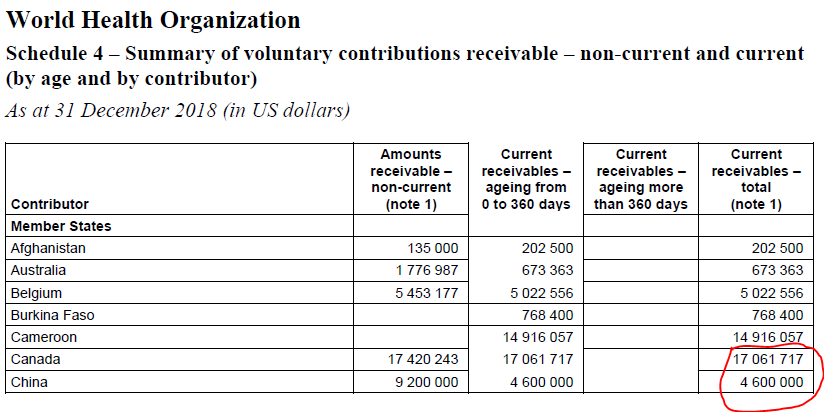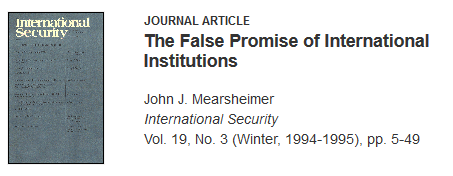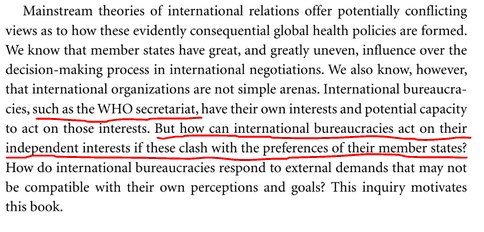Is the @WHO responsible for the global outbreak of #COVID19?
Tough question to answer.
But exploring the question shows how power politics influences international organizations.
[THREAD]
Tough question to answer.
But exploring the question shows how power politics influences international organizations.
[THREAD]
As I explained in an earlier thread, the role of the @WHO, like nearly all International Organizations, is to provide information and facilitate coordination between member states https://twitter.com/ProfPaulPoast/status/1240600123597561857">https://twitter.com/ProfPaulP...
But did the @WHO play that role with the #COVID19 outbreak?
Folks are saying, "No", at least not during the initial stages of the crisis.
Examples include here... https://twitter.com/KanchanGupta/status/1242335180871708673">https://twitter.com/KanchanGu...
Folks are saying, "No", at least not during the initial stages of the crisis.
Examples include here... https://twitter.com/KanchanGupta/status/1242335180871708673">https://twitter.com/KanchanGu...
...and here... https://mobile.twitter.com/SolomonYue/status/1242164952623800320">https://mobile.twitter.com/SolomonYu...
... and in this @CFR_org piece by @mlcollins_. https://www.cfr.org/blog/who-and-china-dereliction-duty">https://www.cfr.org/blog/who-...
Indeed,  https://abs.twimg.com/emoji/v2/... draggable="false" alt="🇺🇸" title="Flag of United States" aria-label="Emoji: Flag of United States"> @SenRickScott is calling for a congressional probe of how the @WHO handled the outbreak (given that the US is a large donor to the organization) https://thehill.com/homenews/senate/490428-rick-scott-calls-for-congressional-probe-into-who-over-coronavirus-response">https://thehill.com/homenews/...
https://abs.twimg.com/emoji/v2/... draggable="false" alt="🇺🇸" title="Flag of United States" aria-label="Emoji: Flag of United States"> @SenRickScott is calling for a congressional probe of how the @WHO handled the outbreak (given that the US is a large donor to the organization) https://thehill.com/homenews/senate/490428-rick-scott-calls-for-congressional-probe-into-who-over-coronavirus-response">https://thehill.com/homenews/...
The claim of these critics is that  https://abs.twimg.com/emoji/v2/... draggable="false" alt="🇨🇳" title="Flag of China" aria-label="Emoji: Flag of China"> pressured the @WHO to refrain from "sounding the alarm" over #COVID19 back in January and February.
https://abs.twimg.com/emoji/v2/... draggable="false" alt="🇨🇳" title="Flag of China" aria-label="Emoji: Flag of China"> pressured the @WHO to refrain from "sounding the alarm" over #COVID19 back in January and February.
Moreover, it appears that  https://abs.twimg.com/emoji/v2/... draggable="false" alt="🇨🇳" title="Flag of China" aria-label="Emoji: Flag of China">& #39;s influence on the @WHO extends beyond the #COVID19 crisis.
https://abs.twimg.com/emoji/v2/... draggable="false" alt="🇨🇳" title="Flag of China" aria-label="Emoji: Flag of China">& #39;s influence on the @WHO extends beyond the #COVID19 crisis.
China has been able to prevent the @WHO from recognizing Taiwan, a point recently discussed by @HalBrands in @bopinion https://twitter.com/HalBrands/status/1245112380167782402">https://twitter.com/HalBrands...
China has been able to prevent the @WHO from recognizing Taiwan, a point recently discussed by @HalBrands in @bopinion https://twitter.com/HalBrands/status/1245112380167782402">https://twitter.com/HalBrands...
Indeed, it seems the  https://abs.twimg.com/emoji/v2/... draggable="false" alt="🇨🇳" title="Flag of China" aria-label="Emoji: Flag of China">
https://abs.twimg.com/emoji/v2/... draggable="false" alt="🇨🇳" title="Flag of China" aria-label="Emoji: Flag of China"> https://abs.twimg.com/emoji/v2/... draggable="false" alt="🇹🇼" title="Flag of Taiwan" aria-label="Emoji: Flag of Taiwan"> issue within the @WHO came to a head during a recent interview https://twitter.com/ezracheungtoto/status/1243869774410469376">https://twitter.com/ezracheun...
https://abs.twimg.com/emoji/v2/... draggable="false" alt="🇹🇼" title="Flag of Taiwan" aria-label="Emoji: Flag of Taiwan"> issue within the @WHO came to a head during a recent interview https://twitter.com/ezracheungtoto/status/1243869774410469376">https://twitter.com/ezracheun...
How is China able to influence the @WHO?
Is it simply a matter of money, perhaps because the @WHO is dependent on the donations of member states?
Is it simply a matter of money, perhaps because the @WHO is dependent on the donations of member states?
That seems unlikely, since China doesn& #39;t actually contribute a huge amount to the @WHO.
This is a page from a WHO report on 2018 contributions: https://abs.twimg.com/emoji/v2/... draggable="false" alt="🇨🇳" title="Flag of China" aria-label="Emoji: Flag of China">gives way less than
https://abs.twimg.com/emoji/v2/... draggable="false" alt="🇨🇳" title="Flag of China" aria-label="Emoji: Flag of China">gives way less than  https://abs.twimg.com/emoji/v2/... draggable="false" alt="🇨🇦" title="Flag of Canada" aria-label="Emoji: Flag of Canada">(& Cameroon and WAY less than the USA or UK (both over $100 million)
https://abs.twimg.com/emoji/v2/... draggable="false" alt="🇨🇦" title="Flag of Canada" aria-label="Emoji: Flag of Canada">(& Cameroon and WAY less than the USA or UK (both over $100 million)
Source: https://apps.who.int/gb/ebwha/pdf_files/WHA72/A72_INF5-en.pdf">https://apps.who.int/gb/ebwha/...
This is a page from a WHO report on 2018 contributions:
Source: https://apps.who.int/gb/ebwha/pdf_files/WHA72/A72_INF5-en.pdf">https://apps.who.int/gb/ebwha/...
Instead, as @mplngr points out in a recent @washingtonpost interview: “China has learned at least one lesson from SARS [outbreak in 2002]. They& #39;re cooperating with WHO just enough to stave off accusations that they are not cooperating,” https://www.washingtonpost.com/world/asia_pacific/world-health-organization-china-not-sharing-data-on-health-care-worker-coronavirus-infections/2020/02/26/28064fda-54e4-11ea-80ce-37a8d4266c09_story.html">https://www.washingtonpost.com/world/asi...
So the @WHO faces a dilemma:
-- treat China too harshly and you lose all ability to collect data
-- treat China too lightly and other states fail to receive the accurate information they need.
-- treat China too harshly and you lose all ability to collect data
-- treat China too lightly and other states fail to receive the accurate information they need.
This is why some (many?) say that it& #39;s really China that is culpable and, as @JamesKraska argued in @WarOnTheRocks, should be held legally liable https://warontherocks.com/2020/03/china-is-legally-responsible-for-covid-19-damage-and-claims-could-be-in-the-trillions/">https://warontherocks.com/2020/03/c...
More generally, the @WHO& #39;s dilemma highlights a broader issue explored by international relations scholars: International Organizations (IOs) can only fulfill their functions if they are allowed to do so.
At the end of the day, IOs are created by and sustained by member states.
At the end of the day, IOs are created by and sustained by member states.
This point, and its implications, was famously argued by John Mearsheimer in @Journal_IS
https://www.jstor.org/stable/2539078?seq=1">https://www.jstor.org/stable/25...
https://www.jstor.org/stable/2539078?seq=1">https://www.jstor.org/stable/25...
Some tried to argue against his claim, namely Robert Keohane and Lisa Martin
https://www.jstor.org/stable/2539214?seq=1">https://www.jstor.org/stable/25...
https://www.jstor.org/stable/2539214?seq=1">https://www.jstor.org/stable/25...
But Mearsheimer countered that their arguments simply served to emphasize his point
https://muse.jhu.edu/article/447391/summary">https://muse.jhu.edu/article/4...
https://muse.jhu.edu/article/447391/summary">https://muse.jhu.edu/article/4...
It& #39;s a famous exchange (well, famous for IR scholars) and a super nifty summary video is provided by @UNSW: https://www.youtube.com/watch?v=NRdV9bnNMIw">https://www.youtube.com/watch...
What I always found interesting about the exchange is that a couple years later Downs, Rocke, and Barsoom made essentially the same argument as JJM in @IntOrgJournal https://www.cambridge.org/core/journals/international-organization/article/is-the-good-news-about-compliance-good-news-about-cooperation/636DE333F8E1EC944825DDBFD81BE294">https://www.cambridge.org/core/jour...
In this instance, Downs, Rocke, and Barsoom were arguing about the observation by Chayes and Chayes (also in @IntOrgJournal) that states appear to largely comply with international law https://www.cambridge.org/core/journals/international-organization/article/on-compliance/37E0E072106640912AF891106235919F">https://www.cambridge.org/core/jour...
Indeed, this debate captures a broader tendency for international relations scholars and international law scholars to have different baseline assumptions about how states treat international law https://twitter.com/ProfPaulPoast/status/1240970763089436674">https://twitter.com/ProfPaulP...
Bringing it back to the WHO, @NitsanChorev describes well the need for the @WHO to adjust to this dilemma in her @CornellPress book #v=onepage&q&f=false">https://books.google.com/books?id=50-QDwAAQBAJ&printsec=frontcover&source=gbs_ge_summary_r&cad=0 #v=onepage&q&f=false">https://books.google.com/books...
She poses the question asked by this thread and then explores how the @WHO has sought to carve out space for itself to operate and maintain some autonomy despite these pressures
This idea was echoed in a piece in @AMJPublicHealth https://ajph.aphapublications.org/doi/full/10.2105/AJPH.2004.050831">https://ajph.aphapublications.org/doi/full/...
In the piece, they write that it was a matter of survival for the organization: "the WHO began to refashion itself as the coordinator, strategic planner, and leader of global health initiatives as a strategy of survival."
International Organizations do this all the time. It& #39;s indeed a matter of survival for them. Think of @jensstoltenberg& #39;s praise of @realDonaldTrump: it& #39;s necessary to ensure @NATO& #39;s survival. https://www.politico.eu/article/jens-stoltenberg-donald-trump-nato-secretary-general-brain-death-emmanuel-macron-mission-accomplished/">https://www.politico.eu/article/j...

 Read on Twitter
Read on Twitter gives way less than https://abs.twimg.com/emoji/v2/... draggable="false" alt="🇨🇦" title="Flag of Canada" aria-label="Emoji: Flag of Canada">(& Cameroon and WAY less than the USA or UK (both over $100 million)Source: https://apps.who.int/gb/ebwha/..." title="That seems unlikely, since China doesn& #39;t actually contribute a huge amount to the @WHO.This is a page from a WHO report on 2018 contributions: https://abs.twimg.com/emoji/v2/... draggable="false" alt="🇨🇳" title="Flag of China" aria-label="Emoji: Flag of China">gives way less than https://abs.twimg.com/emoji/v2/... draggable="false" alt="🇨🇦" title="Flag of Canada" aria-label="Emoji: Flag of Canada">(& Cameroon and WAY less than the USA or UK (both over $100 million)Source: https://apps.who.int/gb/ebwha/..." class="img-responsive" style="max-width:100%;"/>
gives way less than https://abs.twimg.com/emoji/v2/... draggable="false" alt="🇨🇦" title="Flag of Canada" aria-label="Emoji: Flag of Canada">(& Cameroon and WAY less than the USA or UK (both over $100 million)Source: https://apps.who.int/gb/ebwha/..." title="That seems unlikely, since China doesn& #39;t actually contribute a huge amount to the @WHO.This is a page from a WHO report on 2018 contributions: https://abs.twimg.com/emoji/v2/... draggable="false" alt="🇨🇳" title="Flag of China" aria-label="Emoji: Flag of China">gives way less than https://abs.twimg.com/emoji/v2/... draggable="false" alt="🇨🇦" title="Flag of Canada" aria-label="Emoji: Flag of Canada">(& Cameroon and WAY less than the USA or UK (both over $100 million)Source: https://apps.who.int/gb/ebwha/..." class="img-responsive" style="max-width:100%;"/>





